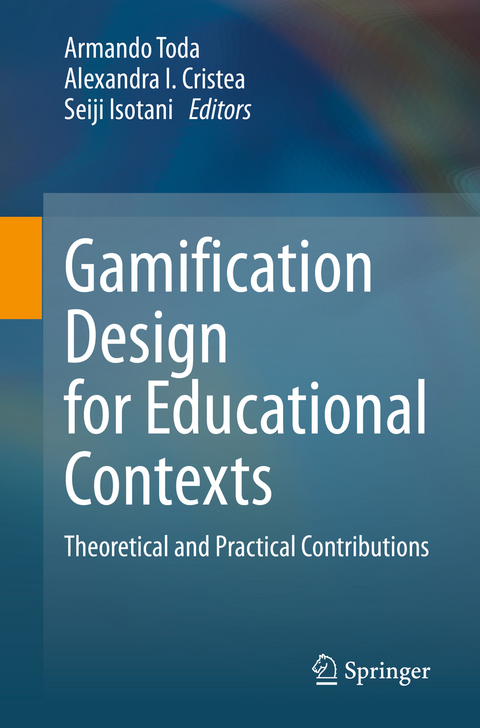
Gamification Design for Educational Contexts
Springer International Publishing (Verlag)
978-3-031-31948-8 (ISBN)
Armando Toda is a lecturer at the University of Sao Paulo, as well as a Postdoctoral Research Assistant at Durham University, and a Postdoc at the University of Sao Paulo. His research includes gamification applied to education, computational thinking, programming learning and training, human-computer interaction, software engineering, and artificial intelligence applied to education. Alexandra Cristea is a Professor, Deputy Executive Dean of the Faculty of Science, Director of Research and Founder of the Artificial Intelligence in Human Systems research group in the Department of Computer Science at Durham University. Her research includes web science, learning analytics, user modelling and personalisation, semantic web, social web and, authoring. Seiji Isotani is a visiting professor of education at the Harvard Graduate School of Education, and a professor of computer science and learning technology at the University of Sao Paulo, Brazil. He has a Ph.D. in information engineering from Osaka University, Japan, and was a postdoctoral researcher at Carnegie Mellon University. He is widely recognized for his work in the fields of Gamification in Education, Intelligent Tutoring Systems (ITS), and Artificial Intelligence in Education (AIED).
Part I Fundamentals Gamification for Education.- Armando Toda, Alexandra I. Cristea, Seiji Isotani .- 1 Games and Gamification.- 2 Gamification in Education.- 3 For Practitioners.- References.- Gamification and Motivation.- Paula T. Palomino, Luiz Rodrigues, Armando Toda.- 1 Introduction.- 2 Self-determination theory.- 2.1 Dissecting Self-Determination Theory.- 2.2 Application.- 2.3 Summary.- 21 3 Flow Theory.- 3.1 Dissecting Flow Theory.- 3.2 Application.- 3.3 Summary.- 4 Cognitive load theory.- 4.1 Dissecting Cognitive Load Theory.- 4.2 Application.- 4.3 Summary.- 5 Goal-setting Theory.- 5.1 Dissecting Goal-setting Theory.- 5.2 Applications.- 5.3 Summary.- 6 Theory of Gamified Learning.- 6.1 Dissecting the Theory.- 6.2 Applications.- 6.3 Summary.- 7 Gamification Science.- 7.1 Dissecting Gamification Science.- 7.2 Applications.- 7.3 Summary.- 8 Concluding Remarks.- References.- Ethical challenges in gamified education research and development: An umbrella review and potential directions.- Ana Carolina Tomé Klock, Brenda Salenave Santana, and Juho Hamari.- 1 Introduction.- 2 Background.- 3 Methodology.- 3.1 Research questions.- 3.2 Inclusion criteria.- 3.3 Search process.- 3.4 Screening procedure.- 3.5 Data extraction plan.- 4 Results.- 4.1 How to make ethical gamification? (RQ1).- 4.2 How to make gamification ethical? (RQ2).- 5 Final remarks.- Acknowledgements.- References.- Theories around Gamification in Education.- Paula T. Palomino.- 1 Introduction.- 2 Gamification Theories for Education.- 2.1 Human-Computer Interaction and User Experience.- 2.2 Gameful Experiences, Gameful Systems, Gameful Design.- 2.3 Gamification Frameworks.- 2.4 Learning Objectives and Learning Activities Types (LATs).- 2.5 ADDIE Instructional Design Framework.- 2.6 Narrative Concepts.- 3 Gamification Frameworks and Guidelines for Education.- 4 Gamification as User Experience (UX).- 5 Concluding Remarks.- References.- Part II Methods and Tools.- TGEEE: Analysis and suggestions for use.-Armando Toda, Alexandra Cristea.- 1 Introduction.- 2 Taxonomy of Gamification Elements for Educational Environments.- 2.1 Performance / Measurement Dimension.- 2.2 Ecological Dimension.- 2.3 Social Dimension.- 2.4 Personal Dimension.- 2.5 Fictional Dimension.- 3 Discussions Limitations of our TGEEE.- 4 Concluding Remarks.- References.- Using Participatory Design to design Gamified interventions in educational environments.- Armando Toda, Elad Yacobson, Giora Alexandron, Paula Palomino, Mauricio Souza, Elian Santos, Alinne Corrêa, Rodrigo Lisboa, Thiago Damasceno Corrêa, and Alexandra Cristea.- 1 Introduction.- 2 Methods.- 3 Case Studies.- 3.1 Gamification of PeTeL.- 3.2 Gamification of a Higher Education virtual course.- 4 Concluding Remarks.- References.- Data Mining in Gamified Learning.- Luiz Rodrigues and Armando Toda.- 1 Introduction.- 2 Data Mining Project.- 2.1 Planning and Reporting.- 2.2 Executing.- 3 EDM Tools.- 3.1 Weka.- 3.2 Orange.- 3.3 R .- 3.4 Python.- 4 Hands-on Data-driven Gamification.- 4.1 GARFIELD: A Regression-based Recommender System.- 4.2 Adaptive Gamification based on Player Type Classification.- 5 Practical Recommendations.- 6 Future Directions.- 7 Final Considerations.- References.- Part III Miscellaneous.- The Dark Aspects of Gamification in Education.- Armando Toda.- 1. Introduction.- 2 Barriers when adopting gamification in educational contexts.- 3 Negative effects on students.- 4 Design principles for gamified interventions.- 5 Concluding remarks.- References.- Evaluation of TGEEE by education professionals.- Armando Toda, Marcia Almeida, Luis Salinas.- 1 Introduction.- 2 Methods.- 2.1 First survey study.- 2.2 Second survey study.- 3 Results.- 3.1 Results from first study.- 3.2 Results from second study.- 4 Discussions.- 5 Concluding Remarks .- References.
| Erscheinungsdatum | 06.09.2023 |
|---|---|
| Zusatzinfo | XI, 137 p. 36 illus., 21 illus. in color. |
| Verlagsort | Cham |
| Sprache | englisch |
| Maße | 155 x 235 mm |
| Gewicht | 242 g |
| Themenwelt | Schulbuch / Wörterbuch ► Unterrichtsvorbereitung ► Unterrichts-Handreichungen |
| Informatik ► Software Entwicklung ► User Interfaces (HCI) | |
| Sozialwissenschaften ► Pädagogik | |
| Schlagworte | Data-driven • Data Mining • Design • Education • Evaluation • Framework • Gamification • literature review • Mixed Methods |
| ISBN-10 | 3-031-31948-6 / 3031319486 |
| ISBN-13 | 978-3-031-31948-8 / 9783031319488 |
| Zustand | Neuware |
| Haben Sie eine Frage zum Produkt? |
aus dem Bereich


